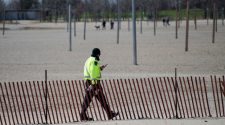OAKLAND — Saying that “Oakland must create a new system of public safety and justice based on real numbers that do not mislead the public,” Mayor Libby Schaaf cast the tie-breaking vote Tuesday night to defeat a budget plan to slash funding from the Oakland Police Department.
The rejection of the alternate proposal by Council members Dan Kalb and Sheng Thao — which called for $2.1 million in OPD cuts and reallocating those funds for, among other things, violence prevention, cleanup at homeless encampments and hiring civilians — also appeared to seal the fate of the main budget amendment plan by Council member Nikki Fortunato Bas and Council President Rebecca Kaplan.
The Bas and Kaplan plan called for reallocating an additional $11.4 million from OPD — for a total of $25 million in cuts — with the goal of reducing police funding by 50% over the next two years. It was widely supported by thousands of Oakland residents, who called for immediate police changes and defunding the OPD. The more than 100 public speakers Tuesday voiced support for the Bas and Kaplan proposal during the nine-hour meeting.
In the end, Bas and Kaplan cast the only yes votes. Vice Mayor Larry Reid and Council members Noel Gallo, Lynette Lynette Gibson McElhaney and Loren Taylor voted no, while Kalb and Thao both abstained.
Before she cast her vote, breaking a 4-4 tie over the Kalb and Thao plan, Schaaf noted that the council had already reduced the OPD budget by more than $14 million on June 23.
“As you’ve heard from our finance director and our chief of police, any further cuts, real cuts to the police department will require a significant reduction to our widely recognized inadequate 911 response, elimination of current police services and well as further strain on what is well documented as an understaffed police force, having the lowest officer police per crime staffing of any department in America,” Schaaf said.
“I know we all support reimagining public safety and advancing racial justice — council has already committed to doing just that — but I believe that Oakland must create a new system of public safety and justice based on real numbers that do not mislead the public about the impact of the cuts or whether or not they actually can be accomplished,” she continued.
Schaaf praised the council for passing its budget on June 23 “that addressed seemingly competing community demands to both defund the police and to, at the very least, preserve police services and 911 response.” She said the budget reflected the council’s commitment “to do so much more with thoughtful analysis and community involvement.”
The proposed budget amendments by Kaplan and Bas were in direct response from “an overwhelming number of community members to divert police spending to community needs,” the two cited in their report. Bas, who had crafted a similar plan that was bypassed during the June 23 budget session, described the budget amendments as a “strong proposal” during the meeting.
The amendments by Kaplan and Bas called for: a freeze of OPD positions; a moratorium on arrests for pedestrians and bicycle violators; a reduction in overtime for special events and at demonstrations; and consolidating some operations. The funds would have been reallocated to include a boost in funding for violence prevention for youth, expanding fire prevention and community safety ambassadors in neighborhoods.
A survey by the Anti Police-Terror Project and #DefundthePolice Coalition, completed from July 15-19 by nearly 2,000 Oakland residents, found strong support for deep cuts to the OPD and reallocating funding for housing, mental health support and other social services. The survey showed strong support for the Bas and Kaplan plan.
“Oakland has the opportunity to set an example for the nation with a historic decision to stop law enforcement overspending and invest in services that truly make us safe.” said James Burch, policy director for the Anti Police-Terror Project, before the council meeting.
“Oakland residents are clear on what keeps us safe: housing as a human right, mental health and trauma support, family-sustaining jobs and worker protections, clean streets and fresh air, and restorative justice to resolve conflict through compassion and healing, not a badge and a gun. In other words, WE keep US safe,” said Cat Brooks, co-founder of the Anti Police-Terror Project, in a statement.
Before the budget amendments were rejected, the council approved $37.9 million the city will receive in CARES Act funds from the federal government, which will be used for rent relief, tenant displacement, housing, and to help small businesses and artists and local organizations directly impacted by the coronavirus pandemic.
The council did agree to discuss at its July 28 meeting a plan by Bas and Taylor to form a task force — the Reimagining Public Safety Task Force — to create a reconstruction of public safety in Oakland with the goal of reducing the OPD budget by 50% — or $150 million — over the next two years. Funding would go to housing, mental health support and other social services.
The task force would be established at next week’s meeting and would present its initial recommendations to the council by the end of the year, with the final recommendations to the council in March 2021. The survey by the Anti Police-Terror Project and #DefundthePolice Coalition showed strong support for the task force.
In addition, the council approved a six-month moratorium on OPD stops of pedestrian and bicyclist violations. Kaplan said that although the city’s African American population is about 24%, she said they made up 68% of the pedestrian and bicyclist stops.
















